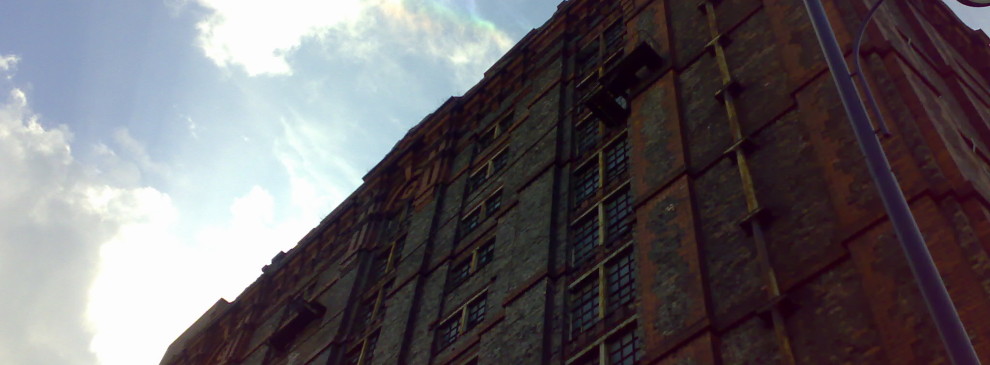A status worth fighting for? Reflections from the first in a series of seminars on the future of the Liverpool World Heritage Site
Added on Monday, October 16th, 2017
…
In 2004, the six areas and associated buildings in the historic centre and docklands that together encompass Liverpool Maritime Mercantile City were listed by UNESCO as a World Heritage Site. Due to its role as a major world trading centre in the 18th and 19th Centuries, the site was judged to be of ‘outstanding universal value’ (OUV). Encompassing the authenticity and integrity of a site, the OUV transcends national boundaries and is of importance to all peoples worldwide.
World Heritage status thus carries with it a responsibility to preserve and protect heritage for current and future generations. In 2012, the decision was taken by UNESCO to place Liverpool on the List of World Heritage in Danger in response to the proposed construction of Liverpool Waters — a controversial redevelopment of the docklands that would alter the skyline and visual landscape of the waterfront, and thereby, UNESCO argued, the OUV of the World Heritage Site itself.
This year, UNESCO issued its final notice — warning that if development went ahead as proposed, Liverpool would lose it World Heritage status by 2018. With this deadline fast approaching, Engage Liverpool CIC decided to host a series of open seminars to facilitate urgently needed debate between UNESCO and the citizens of Liverpool. The first of these seminars, which took place on 4 October in the Liverpool Town Hall, is recounted below.
World Heritage status – what’s it all about?
The first speaker, Isabelle Anatole-Gabriel (UNESCO Chief of the Europe and North America Unit), spoke about the aims of UNESCO, what being a World Heritage Site means, and how there is a collective responsibility to future generations to pass heritage on. She argued that the proposed Liverpool Waters project would change the historic landscape of Liverpool, in a way detrimental to the integrity and authenticity of its World Heritage Site. For UNESCO, she said, the next step, as a result, would be to ask the UK state party to address a series of issues, including halting any planning permission that would put in danger the site’s OUV. If UNESCO are unable to accomplish this, she noted, the site will lose World Heritage status.
Henry Owen-John, Head of International Advice at Historic England, then discussed the context of heritage conventions and the difficult balance between competing historic, economic and social pressures. In outlining the three pillars of ‘outstanding universal value’ (i.e. meeting the criteria, authenticity and integrity, site management), he echoed the notion that World Heritage status brings with it international collaboration and also a duty of care. There is also, he argued, a need for engagement and consultation with all communities of interest within a World Heritage Site and a need for wider engagement (see UNESCO’s Five C’s).
| This year, UNESCO issued its final notice — warning that if development went ahead as proposed, Liverpool would lose it World Heritage status by 2018. |
…
Short comments and reflections were then invited from the local panel. Dr Beatriz Garcia (ICC Director) began by asking what it means for Liverpool to be a Maritime Mercantile city, especially where differences in narratives and sometimes fragmentary or historically unclear debate add further dimensions to exploring questions of value and meaning. David Fleming (Director, National Museums Liverpool) commented that previous debate around World Heritage status had been poor — reiterating that Liverpool needs to listen to UNESCO, and UNESCO to Liverpool. Finally, Councillor Barry Kushner (Cabinet Member for Children’s Services) spoke about the pride in the city in its historic buildings and the strong desire to retain World Heritage status — touching on the need for more regulation of planning and development.
“Why did the developments continue?”
The floor was then opened to questions from the audience. The first question posed to the panel enquired why the council had allowed development to go ahead, even after UNESCO’s 2012 warning. Councillor Kushner responded that, for a city that had witnessed several decades of economic decline, development could not simply be stopped altogether; however, he acknowledged the imperative for development to be carried out with sympathy for local heritage. Two further audience members posed questions around planning and redevelopment. Both commented that they did not understand why ‘generic, glass-fronted’ buildings were being built, with the third questioner saying that she wanted “people to come to Liverpool and know they are in Liverpool”. Attendees also expressed concerns about visitor numbers and perceptions of the city, as well as the impact of waterfront development on the wider environment and wildlife beyond the city. (The next seminar, on development and conservation, will most certainly explore these issues further.)
The ICC conducted research in 2013-14 that assessed the impact of World Heritage designation on Liverpool. This research raised questions which clearly still need to be answered — chief among them being what it means to be an urban World Heritage Site. This first Engage seminar enabled the beginnings of an open discussion around this issue. Heritage sites and the landscapes in which they are embedded contain within them multi layered histories, contemporary experiences, and imagined futures, all of which are constantly evolving. The key to protecting heritage — and maximising its relevance across stakeholders — is to acknowledge these diverse concerns, narratives and experiences, and to encourage an ongoing process of communication and engagement with those communities that are integral to the sites and their meanings.
Click here For more details of the Liverpool UNESCO seminar series.









